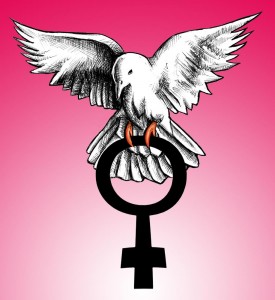
“Violence against women is perhaps the most shameful human rights violation, and it is perhaps the most pervasive. It knows no boundaries of geography, culture or wealth. As long as it continues, we cannot claim to be making real progress towards equality, development, and peace.” – UN Secretary General Kofi Annan
Today is the 104th International Women’s Day, a day when women all over the world celebrate their many achievements. And I’m not just talking about women becoming prime ministers or astronauts. No, I mean the really big stuff like the 67-year-old-woman from Yorkshire who, after years of abuse, says ‘no’ to her husband. Or the girl in Cornwall, just come out of social services ‘care’, with no family and crippled by poverty and self-doubt, who finds the courage to pick up the phone and ask someone for help. Or the young women in Nottingham, going cold turkey, trying desperately to leave sex work behind her.
Women and girls today in every society I can think of, face problems of one kind or another. Some are extreme: in Afghanistan, its being treated worse than a dog; in Congo, its systematic rape; in Saudi, its being the property of your male relatives; in Chile its being unable to get a legal abortion. In the so-called ‘civilised’ world the problems are often subtle or misunderstood, even by women themselves, but they exist nonetheless. Despite shifts in attitude and changes in the law, women are still second-class citizens. Is it any wonder so many turn drugs or alcohol, self-harm or suffer from eating disorders?
At the beginning of the 20th century women in Europe and America were finding their voice. They wanted decent jobs, better pay and the right to vote. It was out of this dissatisfaction that International Women’s Day grew. And yet, over a century since the first International Women’s Day was celebrated, many women don’t know about it.
Kealy, 21, from London, said: “I only found out that this day even existed last year. Not once during my five years at an all-girls secondary school was there any mention of it. How are girls meant to learn from the achievements of other women if they don’t know about them? Is it any wonder girls don’t aspire to more?”
Yes, yes, we can now go to university (if we have enough cash), we can combine a career and a family (though that’s damned hard to do), we can vote (if there’s anyone worth voting for), we can control our fertility, and many of us have real choices. It’s not surprising then that many people, men and women, feel that the battles fought by the 1920s suffragists and the 1970s feminists have been won. But they haven’t.
Ever since Eve scrumped that damned apple, our culturally Christian society still retains prejudice against women in its DNA.
Women still are not equally represented in business or politics, and women’s education and health is universally worse than men’s. Statistics are not sexy, but bear with me, dear Reader, for the rest of this paragraph. The gender pay gap (the difference between what men and women are paid) stands at 17% for full-time workers and 37% for part-time. In the UK an estimated 10,000 women are sexually assaulted every week, and a quarter of all women need treatment for depression at some time in their lives, compared with one in 10 men.
And now, girls face sexual objectification from an ever earlier age. Naomi, 22, from Bristol told me: “It’s wrong that girls feel they have to grow up so fast. There’s a pressure for girls to behave like they’re sexually active when they’re still just children. They see videos of pop stars prancing around in G-strings. It’s not easy for girls to just accept who they are.” And Sarah, 18, from Wolverhampton agrees: “At school everyone read celebrity magazines and were obsessed by who’s got a boyfriend and who’s had sex. Looking back I remember the pressure and feeling so bad about myself.”
With norks-out models plastered all over the media it’s not surprising that 63% of teenage girls now aspire to be glamour models; 25% lap dancers; and just 4% doctors. How sad is that? We need to teach our daughters that getting their jugs out is not empowering, it’s embarrassing and degrading; they can be so much more than just a pair of tits.
Tell your daughters that they deserve respect, fair pay, worthwhile work and to have their opinions heard. Tell them that the world is crying out for them to use their brains, their creativity, their compassion, their common sense. Tell them what’s possible, and tell them today! If you don’t tell them, who will?
It’s still a man’s world. And that’s why, for one day out of 365, International Women’s Day still matters.
[Written by Jane Tomlinson]


8 Responses to 8th March – International Women’s Day